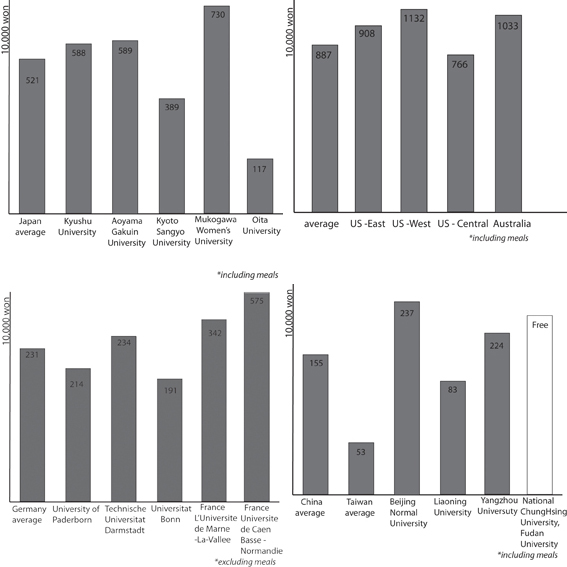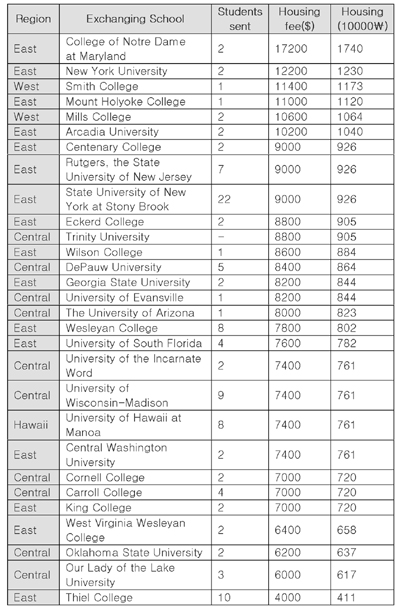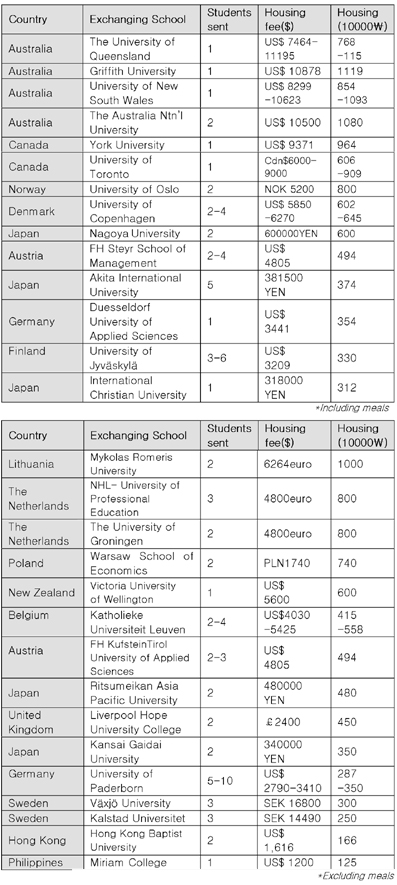
When students participate in the exchange student program, they have a chance to study at another university for a semester or a year and bring up to 18 credits per semester back to Ewha. The students pay normal tuition to Ewha and their semester abroad is approved as a regular semester. However, there are other costs such as housing and transportation costs that may differ from school to school.
The process of recruiting the prospective students is done in early June and early December every year. The students are evaluated according to their Grade Point Average (GPA) and language ability, which is judged through official language test scores or a written examination and an interview conducted by the OGA. GPA and language ability are each worth half of the total score that decides the rank of each student to be selected for the program.
After the selection process, the students choose which schools they will study at from the exchange schools in their language category. It is at their step that the Office of Global Affairs recommends students pay attention to the housing fees, meal plans and airplane ticket prices for each potential destination.

“It is important that the students know about the process of applying for accommodations. The OGA takes care of admissions part, but once they get admitted, they must take care of accommodation,” said the official in charge of the exchange student program at the OGA. “There are two different ways to apply for board. First, it can be being taken care of during the process of applying; this can be done through the OGA. Second, students can apply individually after they get admitted to the school.” she added.
According to information on costs for Fall 2008 on several schools’ websites (see fact box), room and board expenses varied. The most expensive school was the college of Notre Dame at Maryland with 17,200 USD while some schools offer room and board for free. Exact prices vary, and some schools also were that prices and subject to increases. Most of the boarding expenses include meal plan, but some did not. Some students are surprised to find out that the expense of spending a semester abroad as an exchange student is so high.

“I got accepted for the exchange program but I found it will be quiet expensive to support my stay. So I am planning to earn money during the summer vacation. Also, I heard that there are some scholarships for students who participate in the exchange student program,” said Lee Ji-soo (International Studies, 2).
There are three ways of receiving scholarships for the exchange program. Firstly, students can apply for school scholarship at Ewha. Amounts awarded vary according to the country and school the students are sent to. Also, there are two private companies that offer scholarships for prospective exchange students. KB Bank offers scholarships ranging from plane tickets to living expenses. “For the KB exchange scholarship, students must apply in advance of their application for the exchange program. For example, they should apply in March if they are planning to apply as an exchange student in June, or apply in September for the December exchange program,” said one staff member at the OGA.
“There is also another scholarship offered by Mirae Asset which selects about 500 students every year. For spring semester exchange students, the students should apply in October or November, and fall semester exchange students should apply in April or May,” said Lee who also wants to apply for the scholarships.
Finally, some the exchange schools themselves offer scholarships and students should apply for them after they get accepted. Some schools in China offer free boarding and some schools in the United States offer scholarships too. Most of the schools in Japan offers scholarships and the students can also apply for the scholarship offered by JASSO (the Japan Student Service Organization).
고은혜 기자
picgirl@ewhain.net

